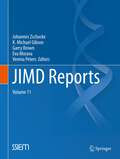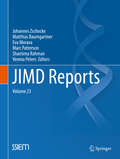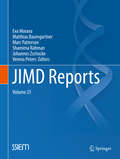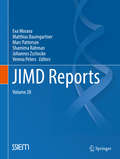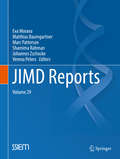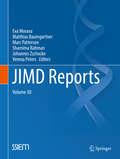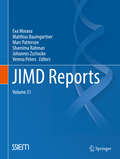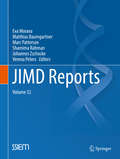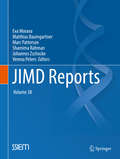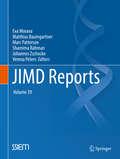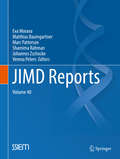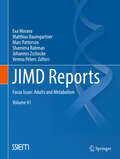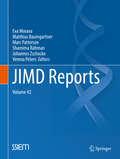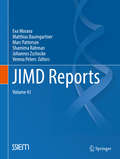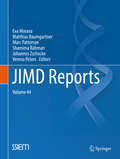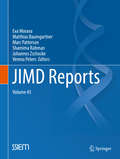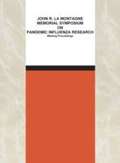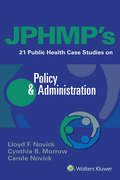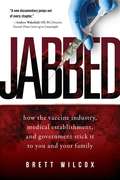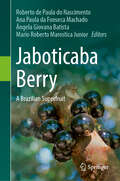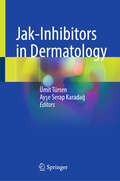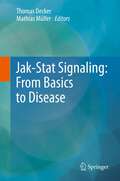- Table View
- List View
JIMD Reports - Volume 10
by Johannes Zschocke Garry Brown Eva Morava Verena Peters K Michael GibsonJIMD Reports publishes case and short research reports in the area of inherited metabolic disorders. Case reports highlight some unusual or previously unrecorded feature relevant to the disorder, or serve as an important reminder of clinical or biochemical features of a Mendelian disorder.
JIMD Reports, Volume 25
by Johannes Zschocke Eva Morava Verena Peters Matthias Baumgartner Marc Patterson Shamima RahmanJIMD Reports publishes case and short research reports in the area of inherited metabolic disorders. Case reports highlight some unusual or previously unrecorded feature relevant to the disorder, or serve as an important reminder of clinical or biochemical features of a Mendelian disorder.
JIMD Reports, Volume 25
by Johannes Zschocke Eva Morava Verena Peters Matthias Baumgartner Marc Patterson Shamima RahmanJIMD Reports publishes case and short research reports in the area of inherited metabolic disorders. Case reports highlight some unusual or previously unrecorded feature relevant to the disorder, or serve as an important reminder of clinical or biochemical features of a Mendelian disorder.
JIMD Reports, Volume 28
by Johannes Zschocke Eva Morava Verena Peters Matthias Baumgartner Marc Patterson Shamima RahmanJIMD Reports publishes case and short research reports in the area of inherited metabolic disorders. Case reports highlight some unusual or previously unrecorded feature relevant to the disorder, or serve as an important reminder of clinical or biochemical features of a Mendelian disorder.
JIMD Reports, Volume 29
by Johannes Zschocke Eva Morava Verena Peters Matthias Baumgartner Marc Patterson Shamima RahmanJIMD Reports publishes case and short research reports in the area of inherited metabolic disorders. Case reports highlight some unusual or previously unrecorded feature relevant to the disorder, or serve as an important reminder of clinical or biochemical features of a Mendelian disorder.
JIMD Reports, Volume 30
by Johannes Zschocke Eva Morava Verena Peters Matthias Baumgartner Marc Patterson Shamima RahmanJIMD Reports publishes case and short research reports in the area of inherited metabolic disorders. Case reports highlight some unusual or previously unrecorded feature relevant to the disorder, or serve as an important reminder of clinical or biochemical features of a Mendelian disorder.
JIMD Reports, Volume 31
by Johannes Zschocke Eva Morava Verena Peters Matthias Baumgartner Marc Patterson Shamima RahmanJIMD Reports publishes case and short research reports in the area of inherited metabolic disorders. Case reports highlight some unusual or previously unrecorded feature relevant to the disorder, or serve as an important reminder of clinical or biochemical features of a Mendelian disorder.
JIMD Reports, Volume 32
by Johannes Zschocke Eva Morava Verena Peters Matthias Baumgartner Marc Patterson Shamima RahmanJIMD Reports publishes case and short research reports in the area of inherited metabolic disorders. Case reports highlight some unusual or previously unrecorded feature relevant to the disorder, or serve as an important reminder of clinical or biochemical features of a Mendelian disorder.
JIMD Reports, Volume 38 (Jimd Reports #38)
by Johannes Zschocke Eva Morava Verena Peters Matthias Baumgartner Marc Patterson Shamima RahmanJIMD Reports publishes case and short research reports in the area of inherited metabolic disorders. Case reports highlight some unusual or previously unrecorded feature relevant to the disorder, or serve as an important reminder of clinical or biochemical features of a Mendelian disorder.The chapter 'Open-Label Single-Sequence Crossover Study Evaluating Pharmacokinetics, Efficacy, and Safety of Once-Daily Dosing of Nitisinone in Patients with Hereditary Tyrosinemia Type 1 (HT-1)' is open access under a CC BY 4.0 license via link.springer.com.
JIMD Reports, Volume 39 (Jimd Reports #39)
by Johannes Zschocke Eva Morava Verena Peters Matthias Baumgartner Marc Patterson Shamima RahmanJIMD Reports publishes case and short research reports in the area of inherited metabolic disorders. Case reports highlight some unusual or previously unrecorded feature relevant to the disorder, or serve as an important reminder of clinical or biochemical features of a Mendelian disorder.
JIMD Reports, Volume 40 (JIMD Reports #40)
by Johannes Zschocke Eva Morava Verena Peters Matthias Baumgartner Marc Patterson Shamima RahmanJIMD Reports publishes case and short research reports in the area of inherited metabolic disorders. Case reports highlight some unusual or previously unrecorded feature relevant to the disorder, or serve as an important reminder of clinical or biochemical features of a Mendelian disorder.
JIMD Reports, Volume 41: Focus Issue: Adults And Metabolism (Jimd Reports #41)
by Johannes Zschocke Eva Morava Verena Peters Matthias Baumgartner Marc Patterson Shamima RahmanJIMD Reports publishes case and short research reports in the area of inherited metabolic disorders. Case reports highlight some unusual or previously unrecorded feature relevant to the disorder, or serve as an important reminder of clinical or biochemical features of a Mendelian disorder.
JIMD Reports, Volume 42 (JIMD Reports #42)
by Johannes Zschocke Eva Morava Verena Peters Matthias Baumgartner Marc Patterson Shamima RahmanJIMD Reports publishes case and short research reports in the area of inherited metabolic disorders. Case reports highlight some unusual or previously unrecorded feature relevant to the disorder, or serve as an important reminder of clinical or biochemical features of a Mendelian disorder.
JIMD Reports, Volume 43 (JIMD Reports #43)
by Johannes Zschocke Eva Morava Verena Peters Matthias Baumgartner Marc Patterson Shamima RahmanJIMD Reports publishes case and short research reports in the area of inherited metabolic disorders. Case reports highlight some unusual or previously unrecorded feature relevant to the disorder, or serve as an important reminder of clinical or biochemical features of a Mendelian disorder.
JIMD Reports, Volume 44 (JIMD Reports #44)
by Johannes Zschocke Eva Morava Verena Peters Matthias Baumgartner Marc Patterson Shamima RahmanJIMD Reports publishes case and short research reports in the area of inherited metabolic disorders. Case reports highlight some unusual or previously unrecorded feature relevant to the disorder, or serve as an important reminder of clinical or biochemical features of a Mendelian disorder.
JIMD Reports, Volume 45 (JIMD Reports #45)
by Johannes Zschocke Eva Morava Verena Peters Matthias Baumgartner Marc Patterson Shamima RahmanJIMD Reports publishes case and short research reports in the area of inherited metabolic disorders. Case reports highlight some unusual or previously unrecorded feature relevant to the disorder, or serve as an important reminder of clinical or biochemical features of a Mendelian disorder.
JOHN R. LA MONTAGNE MEMORIAL SYMPOSIUM ON PANDEMIC INFLUENZA RESEARCH: Meeting Proceedings
by National Research Council of the National AcademiesThe National Academies Press (NAP)--publisher for the National Academies--publishes more than 200 books a year offering the most authoritative views, definitive information, and groundbreaking recommendations on a wide range of topics in science, engineering, and health. Our books are unique in that they are authored by the nation's leading experts in every scientific field.
JPHMP's 21 Public Health Case Studies on Policy & Administration
by Lloyd NovickJPHMP's 21 Public Health Case Studies on Policy & Administration, compiled by the founding editor and current editor-in-chief of the Journal of Public Health Management and Practice, provides you with real-life examples of how to strategize and execute policies and practices when confronted with issues such as disease containment, emergency preparedness, and organizational, management, and administrative problems.
Jabbed: How the Vaccine Industry, Medical Establishment, and Government Stick It to You and Your Family
by Brett WilcoxJabbed demonstrates that the medical procedure hailed as the greatest medical advancement in history—vaccines—is a racket run by criminals and gullible believers who have replaced vaccine science with the religion of vaccinology. Vaccine marketers teach believers to fear, shame, and scapegoat anyone foolish enough to question the sanctity of vaccines. Such an environment is not the domain of science; rather it’s the breeding ground of tyranny.Jabbed exposes this tyranny. From polio and smallpox to medical journals, medical curricula, congressional hearings, regulatory policies, White House statements, and executive orders, Jabbed shines light on the dark underbelly of Big Pharma, Big Medicine, and Big Government.A vaccine informed public is the only thing that will have the power to stop vaccine industry sociopaths and to hold them accountable for their crimes.Jabbed informs and immunizes against three of the most dangerous epidemics in history: tyranny, greed, and corruption. Once immunized, the growing vaccine-informed community will have the power to stand up and dismantle the vaccine paradigm and program and to punish the perpetrators of what may well be the greatest medical fraud ever perpetrated on the human race: vaccines.
Jaboticaba Berry: A Brazilian Superfruit
by Roberto de Paula do Nascimento Ana Paula da Fonseca Machado Ângela Giovana Batista Mario Roberto Marostica JuniorJaboticaba Berry (Plinia spp.), a native fruit from the Brazilian Atlantic Forest, has been associated with several benefits for the prevention or therapy of chronic diseases due to its promising set-up of antioxidants and nutrients. Jaboticaba shows a distinguished amount of bioactive compounds when compared to other popular berries, which instigates great interest in pharmaceutical and food usage. The many parts of the berry, but especially the seed and peel by-products, are rich in dietary fibers and phenolic compounds and therefore have been able to counteract the negative implications of obesity, diabetes, inflammation, hepatic complications, and cancers, as shown by experimental studies. The development of new products and alternative therapies calls for the understanding of jaboticaba’s history, occurrence, morphology, nutritional and chemical composition, and industrial usage potential, reunited in this book. Well-founded and cutting-edge Jaboticaba berry: A Brazilian superfruit aims to instigate and inspire researchers, health and academic professionals, food and pharmaceutical scientists, educators, students, and all of those interested in natural products, herbal medicine, innovative alternative therapies, and sustainable use of by-products.
Jahresabschluss, Kostenrechnung und Finanzierung im Krankenhaus: Grundlagen und Zusammenhänge verstehen
by Gerald SchmolaDer Jahresabschluss, die Kostenrechnung sowie die Finanzierung im Krankenhaussektor sind für Nicht-Ökonomen oftmals sehr komplex und kaum zu durchschauen. Insbesondere leitende Ärzte und Pflegekräfte, Betriebs- und Personalräte oder aber auch Quereinsteiger im Krankenhausbereich finden kaum kompakte und verständliche Darstellungen der Zahlenwelt eines Krankenhauses. Das vorliegende Buch schließt diese Lücke: Es gibt eine allgemeine Einführung in die Themenfelder und geht zudem auf die Besonderheiten des Jahresabschlusses, der Kostenrechnung sowie der Finanzierung von Kliniken ein. Der Leser kann sich durch Selbst-Studium die wichtigsten Grundlagen zur Finanzierung im Krankenhaus aneignen, sodass eine fachliche Diskussion mit Betriebswirten in Gesundheitseinrichtungen möglich wird. Das Werk richtet sich auch an Bachelorstudierende mit Bezug zum Gesundheitswesen sowie an Teilnehmer von MBA-Programmen für Nicht-Betriebswirte.
Jak-Inhibitors in Dermatology
by Ayşe Serap Karadağ Ümit TürsenThis book covers the clinical usage of JAK inhibitors, which target Janus kinases and have shown promising results in the treatment of various dermatologic conditions, including atopic dermatitis, psoriasis, vitiligo, connective tissue disorders, autoimmune bullous diseases and alopecia areata. It is likely that JAK inhibitors will continue to play an important role in the management of these conditions, with clinical trials ongoing to assess their safety and efficacy in the treatment of other dermatologic disorders, such as vitiligo and hidradenitis suppurativa. However, it is important to note that JAK inhibitors can have potential side effects, including increased risk of infections, anemia and thrombosis. Therefore, careful monitoring of patients receiving JAK inhibitors is necessary to ensure their safety.Jak Inhibitors in Dermatology represents a treatise on this novel topic and discusses that while JAK inhibitors have shown great promise in the treatment of various dermatologic conditions, further research and monitoring is necessary to fully understand their potential benefits and risks. This book is therefore of great interest for all dermatologists as a first step to understanding this novel treatment.
Jak-Stat Signaling: From Basics to Disease
by Mathias Müller Thomas DeckerJAK tyrosine kinases and STAT transcription factors constitute a signaling pathway, which is activated by cytokines. By activating gene transcription it regulates essential biological responses to environmental cues. The Jak-Stat pathway is involved in the regulation of cell development, differentiation, proliferation and apoptosis. Improper function may contribute to hematopoietic malignancies and cancer. This book provides comprehensive insights into the latest basic and clinical developments in the field. The first part reviews recent findings and new technologies pertaining to basics of Jak-Stat function. The second part describes the evolution of Jak-Stat signaling and the role of the pathway in invertebrate organisms. The third part focuses on Jak-Stat signaling in hematopoietic cells under both physiological and pathophysiological conditions. Finally, chapters in the fourth section describe the relationship of Jak-Stat signaling to various states of disease, particularly infection, leukemias and solid cancers. The book is intended for all scientists in molecular biology, biochemistry and cell biology dealing with biomedical issues.
James Cowles Prichard of the Red Lodge: A Life of Science during the Age of Improvement (Critical Studies in the History of Anthropology)
by Margaret M. CrumpMargaret M. Crump offers the first thorough biography of British scientist and physician James Cowles Prichard (1786–1848), an intellectual giant in the developing human sciences, a pioneering psychiatric theorist, and Europe&’s leading anthropologist during the first half of the nineteenth century.
James Herriot's Animal Stories
by James HerriotFew authors in memory have delighted readers around the world thoroughly as the beloved veterinarian James Herriot. And, with his recent volumes of hugely popular illustrated tales—James Herriot's Cat Stories and James Herriot's Favorite Dog Stories—his name has been introduced to a whole new generation of readers. Now, this gorgeous new collection finally brings together ten of his best-loved stories celebrating all the creatures in his wonderful world—creatures bright and beautiful, great and small. Here are lambs, horses, cows, dogs, even a whimsical pig or two, along with their colorful human counterparts—all brought vividly to life by Herriot's storytelling magic. From a prickly horse young James encountered early in his veterinary-school experience, through Dorothy the goat—star of the entrancing holiday tale "There's Christmas—and Christmas"—we are reacquainted with all the charming companions of Herriot's Yorkshire menagerie. Once again illuminated by the radiant watercolors of Lesley Holmes, each of Herriot's animal friends is rendered with the kind of warmth and humor that comes with old, familiar friendship. With a special introduction by Herriot's own son Jim, the stories in this bright new collection will warm readers of every age.
